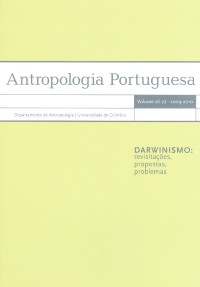Please use this identifier to cite or link to this item:
https://hdl.handle.net/10316.2/28626| DC Field | Value | Language |
|---|---|---|
| dc.contributor.author | Pereira, Ana Leonor | - |
| dc.contributor.author | Fonseca, Pedro | - |
| dc.date.accessioned | 2014-02-06T12:03:57Z | |
| dc.date.accessioned | 2020-09-14T11:12:07Z | - |
| dc.date.available | 2014-02-06T12:03:57Z | |
| dc.date.available | 2020-09-14T11:12:07Z | - |
| dc.date.issued | 2010 | - |
| dc.identifier.issn | 2182-7982 | - |
| dc.identifier.uri | https://hdl.handle.net/10316.2/28626 | - |
| dc.description.abstract | During the decades that followed the publication of Charles Darwin’s fundamental work, On the origin of species… (1859), both evolutionism and the idea that living organisms share a common ancestry were generally accepted by the international scientific community. However, natural selection, which the English naturalist had proposed as the main evolutionary mechanism, was only to be generally accepted by the 1930’s and the 1940’s through the establishment of the Modern Synthesis. That period of discredit experienced by natural selection, triggered by a plural range of factors, and hardened by the competition of alternative evolutionary theories, is known as the “eclipse of Darwinism” (Peter J. Bowler). The present paper intends to provide a comprehensive analysis of the evolutionary reflection carried out by Luís Wittnich Carrisso in his degree thesis – Hereditariedade (1910) – by contextualizing it in the climate lived during the “eclipse of Darwinism” (Peter J. Bowler). | eng |
| dc.description.abstract | Nas décadas que se seguiram à publicação da obra fundamental de Charles Darwin, On the origin of species… (1859), o evolucionismo e a ideia de os organismos vivos partilharem uma ancestralidade comum passaram a ser geralmente aceites pela comunidade científica internacional. No entanto, a selecção natural, que o naturalista inglês apresentara como o principal mecanismo evolutivo, só passaria a gozar de uma aceitação generalizada a partir das décadas de 1930 e 1940, com o estabelecimento da Síntese Moderna. Esse período de descrédito da selecção natural, propiciado por um conjunto diversificado de factores, e agravado pela concorrência de teorias de evolução alternativas, é conhecido como o “eclipse do Darwinismo” (Peter J. Bowler). O presente trabalho tem por objectivo proceder a uma leitura compreensiva da reflexão evolucionista realizada por Luís Wittnich Carrisso na sua tese de licenciatura – Hereditariedade (1910) – mediante a sua contextualização no clima vivido durante o “eclipse do Darwinismo” (Peter J. Bowler). | por |
| dc.language.iso | por | - |
| dc.publisher | CIAS - Centro de Investigação em Antropologia e Saúde | - |
| dc.rights | open access | - |
| dc.subject | Darwinism | eng |
| dc.subject | Darwin in Portugal | eng |
| dc.subject | eclipse of Darwinism | eng |
| dc.subject | Luís Wittnich Carrisso | eng |
| dc.subject | Darwinismo | por |
| dc.subject | Darwin em Portugal | por |
| dc.subject | eclipse do Darwinismo | por |
| dc.subject | Luís Wittnich Carrisso | por |
| dc.title | A dissertação manuscrita Hereditariedade (1910, 236 fl.) de Luís Wittnich Carrisso no contexto do “eclipse do Darwinismo” | por |
| dc.type | article | - |
| uc.publication.collection | Antropologia Portuguesa vol. 26/27 | - |
| uc.publication.firstPage | 29 | - |
| uc.publication.lastPage | 48 | - |
| uc.publication.location | Coimbra | - |
| uc.publication.journalTitle | Antropologia Portuguesa | - |
| uc.publication.volume | 26/27 | por |
| dc.identifier.doi | 10.14195/2182-7982_27_2 | - |
| uc.publication.section | Vária | - |
| uc.publication.digCollection | IP | - |
| uc.publication.digCollection | B1 | - |
| uc.publication.orderno | 2 | - |
| uc.publication.area | Ciências Sociais | - |
| uc.publication.manifest | https://dl.uc.pt/json/iiif/10316.2/28626/214028/manifest?manifest=/json/iiif/10316.2/28626/214028/manifest | - |
| uc.publication.thumbnail | https://dl.uc.pt/retrieve/11212333 | - |
| uc.itemId | 70811 | - |
| uc.thumbnail.uri | https://dl.uc.pt/iiif-imgsrv/11212291/dl!3!18!62!24!18622447777029305006823706432294846198 | - |
| item.grantfulltext | open | - |
| item.fulltext | With Fulltext | - |
| Appears in Collections: | Antropologia Portuguesa | |
Files in This Item:
| File | Description | Size | Format | |
|---|---|---|---|---|
| ap26-27_artigo3.pdf | 1.61 MB | Adobe PDF |  |
Items in DSpace are protected by copyright, with all rights reserved, unless otherwise indicated.
